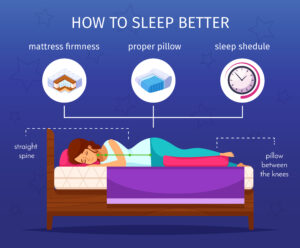Table of Contents
Benefits of Getting Enough Sleep
In today’s busy world, we often forget how important sleep is for our health. But sleeps is super important! It helps our bodies and brains work well. Let’s explore why getting enough sleep is so awesome and how you can make sure you’re getting the rest you need.
What Happens When We Sleep

When we sleep, our bodies and brains do lots of important things to keep us healthy. Our brains sort out the stuff we learned during the day, our muscles repair themselves, and our immune system gets stronger. So, sleeps isn’t just about resting; it’s about keeping our bodies in good shape.
Why Sleep Is Good for Our Bodies
Getting enough sleeps can help us stay healthy in lots of ways. It can help us avoid getting sick, keep our hearts strong, and even help us keep a healthy weight. When we sleep well, our bodies can do all the jobs they need to do to keep us feeling great.
How Sleep Helps Our Brains
Sleep is like a supercharger for our brains! It helps us think clearly, remember things better, and even be in a better mood. When we don’t get enough sleeps, it’s harder to focus and learn new things. That’s why sleep is super important for doing well in school, work, and life in general.
Feeling Happy and Calm with Sleep
Did you know that sleep can also help us feel happier and less stressed? When we sleep enough, our bodies can handle stress better, and we’re more likely to feel positive and relaxed. But when we’re tired, we can get grumpy and find it hard to deal with things. So, getting enough sleep can really help us feel good.
Tips for Better Sleep
If you want to sleep better, there are some simple things you can try:

- Go to bed and wake up at the same time every day.
- Have a relaxing bedtime routine, like reading a book or taking a warm bath.
- Make sure your bedroom is comfy, dark, and quiet.
- Try not to use screens like phones or tablets before bed, as they can make it harder to sleep.
- If you’re still having trouble sleeping, talk to a grown-up. They might be able to help you figure out what’s going on.
Conclusion
Sleep is amazing for our bodies and brains! It helps us stay healthy, happy, and ready to take on the day. By making sure we get enough sleeps and following these simple tips, we can make the most of this superpower and feel our best every day.
FAQs (Frequently Asked Questions)
- How much sleep do I need each night?
- Most kids need about 9-11 hours of sleep each night, while teenagers should aim for 8-10 hours. Adults generally need 7-9 hours of sleep to feel their best.
- Can I catch up on lost sleep by sleeping in on weekends?
- While it’s tempting to sleep in on weekends, it’s not the best way to make up for lost sleep during the week. Try to stick to a consistent sleep schedule every day to maintain good sleep habits.
- Why do I sometimes wake up in the middle of the night?
- Waking up during the night is normal, but if it happens often or you have trouble falling back asleep, it could be due to stress, caffeine, or other factors. Try relaxation techniques or talk to a doctor if it’s a problem.
- Is it okay to nap during the day?
- Napping can be a great way to recharge, but try to keep naps short (around 20-30 minutes) and avoid napping too late in the day, as it can interfere with nighttime sleep.
- Why do I feel groggy when I wake up sometimes?
- Feeling groggy in the morning, even after a full night’s sleep, could be due to waking up in the middle of a sleep cycle. Try to wake up at the end of a sleep cycle (around 90 minutes) for a more refreshed feeling.
- Can what I eat and drink affect my sleep?
- Yes! Eating heavy meals, drinking caffeine or alcohol close to bedtime, and consuming sugary snacks can all interfere with sleep. Opt for lighter meals and avoid caffeine and alcohol before bed for better sleep quality.
- How can I stop worrying and relax before bed?
- Try establishing a calming bedtime routine, such as reading a book, taking a warm bath, or practicing relaxation techniques like deep breathing or meditation. These activities can help signal to your body that it’s time to wind down and sleep.
- What should I do if I consistently have trouble falling asleep?
- If you have trouble falling asleep or staying asleep despite trying good sleep habits, it’s a good idea to talk to a doctor. They can help identify any underlying issues and offer solutions to improve your sleep quality.



